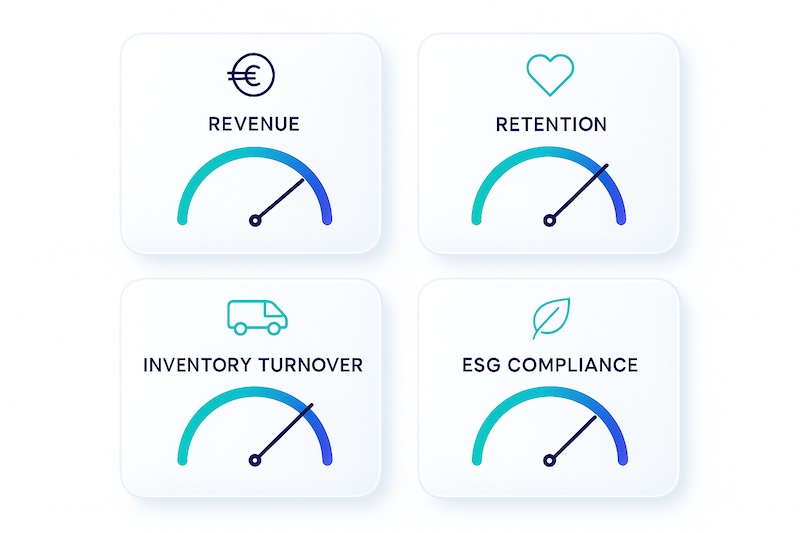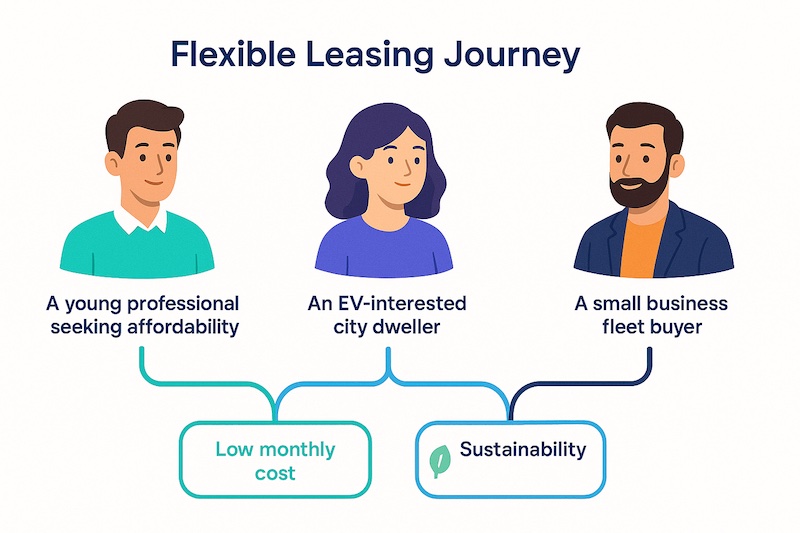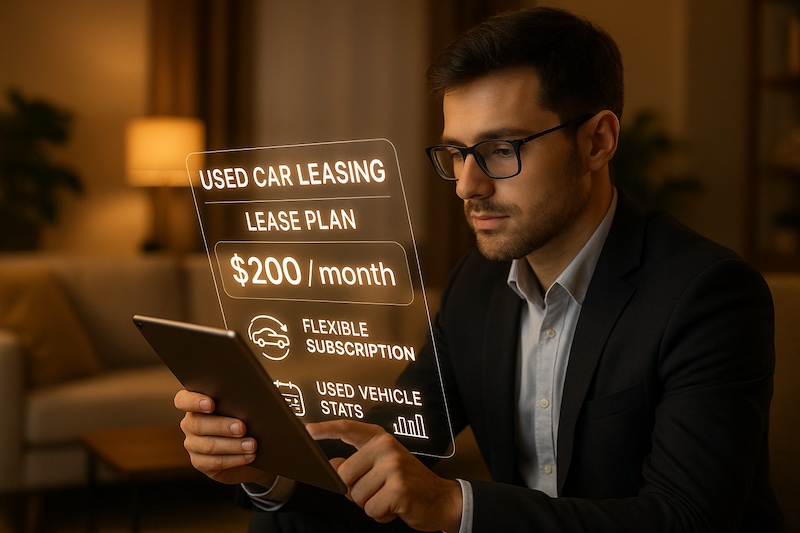Discover why the booming market for used car leasing could be a golden opportunity to drive growth, attract customers, and maximise profits.
The automotive sector faces unprecedented challenges. From inventory shortages to changing consumer preferences, mobility leaders must find new ways to maximise profitability whilst retaining customers. The solution may already be sitting in your car park.
Used car leasing has evolved from a niche offering to a strategic lever that savvy operators are using to drive growth. With the European lease-based used car market projected to reach €390 billion, forward-thinking OEMs and dealer groups are recognising this opportunity to unlock new revenue streams and build stronger customer relationships.
We'll explore five compelling reasons why prioritising used car leasing delivers clear, sustainable competitive advantages that position your business for long-term success.
Too Long ; Didn't Read
- Explosive Market Growth: The European lease-based used car market is expected to hit €390 billion, highlighting the vast untapped potential for operators.
- Sustainable Revenue Streams: Used car leasing opens up lucrative, recurring income opportunities for OEMs and dealer groups.
- Stronger Customer Relationships: Leasing models foster long-term customer engagement and loyalty, creating a win-win for businesses and drivers alike.
- Competitive Differentiation: Early adopters of lease-based models are gaining a significant edge in a competitive automotive landscape.
- Eco-Friendly Appeal: Used car leasing supports sustainability goals by extending the lifecycle of vehicles and reducing waste.
- Flexibility for Consumers: Drivers benefit from cost-effective access to quality vehicles without the financial burden of ownership.
- Future-Proofing Business: Forward-thinking businesses leveraging this trend position themselves for continued growth in a shifting market.
The Key Benefits of Used Car Leasing
Cost-Effective Mobility for Customers
Used car leasing provides an affordable alternative to purchasing new vehicles, enabling customers to access reliable and high-quality cars at a fraction of the cost. This not only enhances accessibility but also caters to the growing demand for flexible and budget-friendly mobility solutions.
Reduced Depreciation Risks
Leasing used cars significantly mitigates the financial impact of depreciation, as these vehicles have already undergone the steepest decline in value. This benefits both lessors and lessees by offering greater financial stability and predictability throughout the lease term.
Sustainability and Circular Economy Alignment
By extending the lifecycle of vehicles through leasing, businesses can actively contribute to sustainability efforts. Promoting the use of pre-owned cars reduces waste and supports a circular economy, aligning with environmentally conscious customer values and corporate responsibility goals.
Larger Addressable Market
The affordability of used car leasing opens the doors to a wider demographic of customers. This includes individuals who may not have considered leasing due to the costs associated with new vehicles, thereby expanding your business's market reach.
Enhanced Revenue Streams and Retention
Leasing used cars offers fleet owners an opportunity to diversify their revenue streams beyond traditional sales. Additionally, providing customers with affordable leasing options fosters longer-term relationships, increasing the likelihood of repeat engagements and upselling opportunities.
1. Unlock Superior Financial Returns with Higher Margins
Used car leasing offers a remarkable opportunity to enhance your bottom line through improved margin structures. The mathematics are compelling: used vehicles carry lower acquisition costs, yet lease payments remain attractive to customers seeking flexible mobility solutions.
The depreciation curve works in your favour with used vehicles. Unlike new cars that experience steep initial depreciation, used vehicles have already absorbed much of their value decline. This creates a smaller gap between market price and residual value, translating directly into higher gross margins per unit compared to new leases.
According to McKinsey research, refined modelling of residual values can unlock €12 billion in added European market value. This presents a significant opportunity for dealers who can accurately forecast and manage residual values across their used vehicle portfolio.
The financial advantages extend beyond simple margin calculations. Used car leasing allows you to tap into price-sensitive market segments without eroding profitability. Customers who might be priced out of new vehicle leases can access quality used vehicles, expanding your addressable market whilst maintaining healthy returns.
Lower depreciation exposure also means better residual risk management. As one Investopedia expert notes, "A smaller depreciation gap means you get more car for less." This fundamental principle makes used car leasing particularly attractive in volatile market conditions.
According to Samantha Lewis, a senior analyst at AutoTrends Insights, "Used car leasing is rapidly becoming a crucial tool for dealerships to build customer loyalty and adapt to changing market demands. It provides flexibility for both the dealer and the consumer, creating opportunities for sustainable growth."
2. Drive Customer-Centric Flexibility and Loyalty
Used car leasing opens doors to new customer demographics whilst building deeper relationships with existing clients. The lower monthly payments inherent in used vehicle leases appeal directly to cost-conscious consumers, creating opportunities to attract first-time buyers, urban dwellers, and younger users who value flexibility over ownership.
Consider the electric vehicle market, where The Wall Street Journal reports that nearly 45% of EV transactions in Q3 2024 were leases, well above the 24% average. This trend is driven by lower monthly payments ($445 versus $717) and reduced commitment anxiety.
The customer retention potential is equally compelling. Used car lease customers often develop loyalty through positive experiences, leading to re-leasing or upgrading to newer models. This creates a predictable customer journey that supports long-term revenue planning.
Used car leasing also supports broader omni-channel and subscription strategies. By offering flexible terms and accessible pricing, you create touchpoints that can evolve with customer needs. This approach builds trust in price-sensitive markets by demonstrating that your business understands and responds to diverse customer circumstances.
The flexibility extends to your ability to serve different customer segments simultaneously. Corporate fleet buyers seeking cost-effective solutions can access the same quality vehicles as individual consumers, maximising asset utilisation across market segments.

READ MORE: How Car Subscription Platforms Help Leasing Companies Launch Faster and Grow Smarter
3. Optimise Residual Value Management and Fleet Depreciation
Strategic residual value management becomes significantly more predictable with used car leasing programmes. Rather than selling vehicles once and hoping for the best market price, you can leverage existing assets multiple times to maximise their lifetime value.
From 2014 to 2024, used car prices rose approximately 3% annually, with a dramatic 50% surge during 2020-22 followed by a 20% correction in multiple European markets. This volatility underscores the importance of controlling your re-marketing pipeline rather than relying on traditional sales approaches.
Used car leasing allows you to extend vehicle lifecycles profitably through certified or reconditioned lease offers. By maintaining control over the vehicle throughout its useful life, you can time re-marketing activities to optimise returns based on market conditions.
The forecasting advantages are substantial. When you control the lease terms and return schedules, you can plan inventory flows with greater precision. This improves cashflow stability and enables more accurate financial planning across your entire operation.
Strategic re-marketing also reduces exposure to market volatility. Instead of being forced to sell vehicles at potentially unfavourable market conditions, you can adjust lease terms, extend contracts, or time disposals to maximise returns.
4. Enhance Inventory Flexibility and Operational Resilience
The supply chain disruptions affecting new vehicle production have highlighted the importance of inventory flexibility. Used car leasing provides a powerful tool to maintain revenue streams when new vehicle availability is constrained.
S&P Global warns of a 41% drop in lease maturities year-on-year in H1 2025, reducing nearly a million vehicles from the market. This scenario presents both a challenge and an opportunity. Dealers who can shift surplus used inventory into lease programmes can counterbalance reduced supply whilst maintaining customer service levels.
BVRLA data shows a 4.86% increase in used vehicle fleet size at end-Q4 2024, driven by strength in used car leasing. This growth demonstrates that the market is already moving towards this model, creating competitive pressure for those who haven't yet adapted.
The operational benefits extend to regional market responsiveness. Different geographic areas may experience varying demand patterns or economic conditions. Used car leasing programmes allow you to deploy inventory dynamically, moving vehicles to where demand is strongest whilst maintaining utilisation rates.
Standing stock costs represent a significant operational expense. By converting static inventory into active lease assets, you improve cash flow whilst reducing the carrying costs associated with unsold vehicles.
5. Advance Sustainability Goals and Brand Positioning
Environmental responsibility has moved from nice-to-have to business-critical. Used car leasing directly supports sustainability objectives by extending vehicle lifecycles and reducing the environmental impact of manufacturing new vehicles.
This approach aligns perfectly with circular economy models increasingly demanded by regulators and customers. Transport & Environment highlights that used EVs enter the market at lower prices, accelerating the transition to cleaner transport whilst extending vehicle life.
The ESG benefits extend beyond environmental impact. Used car leasing demonstrates responsible resource utilisation, supporting corporate sustainability reporting requirements that many organisations now face.
Consumer consciousness around environmental impact continues to grow. By offering used car leasing options, you appeal to environmentally conscious consumers and fleet buyers who want to reduce their carbon footprint without sacrificing mobility.
The innovation aspect shouldn't be overlooked. Used car leasing programmes demonstrate forward-thinking leadership and adaptability, qualities that enhance brand value and customer confidence.

READ MORE: Gen-Z Will Skip the Traditional Car Buying Journey Entirely
Transform Your Business with Strategic Used Car Leasing
The convergence of market pressures, technological capabilities, and changing consumer preferences creates a compelling case for prioritising used car leasing. These five strategic advantages; superior financial returns, customer-centric flexibility, optimised residual value management, operational resilience, and sustainability leadership, form a coherent strategy for long-term success.
The businesses that recognise and act on this opportunity will develop stable revenue streams, build stronger customer loyalty, enhance margins, and position themselves as sustainability leaders. The question isn't whether used car leasing will become mainstream, it's whether your business will lead or follow this transformation.
Senior leaders should evaluate their used car leasing programmes now. The combination of market dynamics, technological enablement, and customer demand creates an environment where early movers can establish significant competitive advantages. Future-proofing your business starts with recognising that used car leasing isn't just about maximising existing assets... it's about building the foundation for tomorrow's mobility business.
Explore Our Latest Insights
Discover trends and innovations in the automotive sector.







